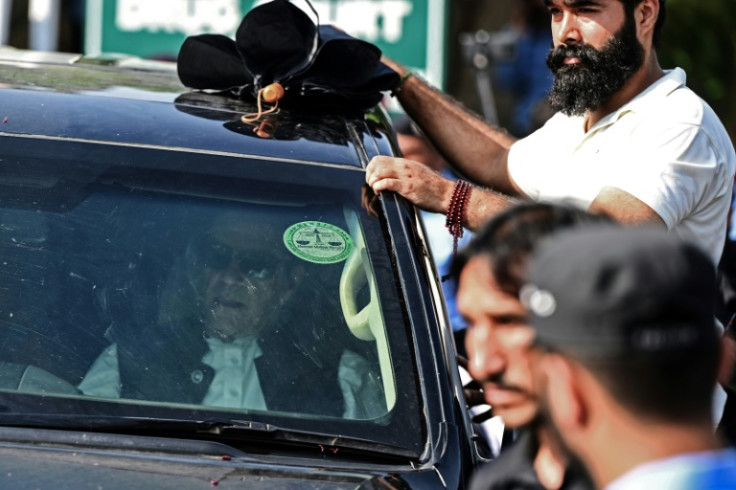Pakistan Says 102 In Military Court Over Ex-PM Khan Arrest Violence

More than 100 people are being tried in Pakistan military courts over violence that erupted after former prime minister Imran Khan was arrested last month, the army said Monday, adding that three officers had been dismissed.
Khan's arrest on graft charges at the Islamabad High Court on May 9 sparked deadly street violence, with thousands of supporters clashing with police and some setting fire to military buildings.
He was released three days later when the Supreme Court declared the detention illegal.
But his Pakistan Tehreek-e-Insaf (PTI) party has been the subject of a crackdown since -- with thousands of supporters arrested, press freedoms muted and reports of intimidation tactics.
Military spokesman Major General Ahmed Sharif Chaudhry said Monday that "102 miscreants are being tried in the already established military courts" in connection with attacks on more than 200 army sites.
"This was a huge heinous conspiracy against Pakistan," Chaudhry told reporters in the garrison city of Rawalpindi. "People were instigated and provoked against the army."
Elections are due by October and Khan has said the ongoing crackdown is a bid to prevent the massively popular politician's party from success at the polls.
Rights monitors have criticised Pakistan's use of opaque military trials for civilians, with Amnesty International previously saying they result in "a catalogue of human rights violations".
Chaudhry said three officers, including a lieutenant general, were dismissed after they "failed to maintain the security and sanctity" of army properties during the unrest.
"Strict disciplinary action" has been taken against a further 15 people, including three major generals and seven brigadiers, he said.
Pakistan's generals hold undue influence over the country's politics, having staged at least three successful coups leading to decades of martial law.
Since being ousted by a no-confidence vote in April last year, Khan has challenged their authority with a series of allegations considered incendiary in Pakistan.
His arrest last month came just hours after he repeated accusations a senior army officer was behind an assassination attempt that saw him shot in the leg.
"In Pakistan, the military is rarely subject to accountability. For the military leadership to publicly announce the firing of senior officers --- that's nothing to sneeze at," said Michael Kugelman, director of the South Asia Institute at the Wilson Center.
"Clearly the military wants to stress that this is a full-on crackdown that will target anyone remotely connected to the violence -- even those that weren't involved in it directly," he told AFP.
Islamabad has accused PTI protestors of committing anti-state terrorism, and this month the army's publicity wing vowed to tighten "the noose of law" around those involved in violence.
Prior to his arrest Khan was staging regular mass rallies, pressuring Prime Minister Shehbaz Sharif's fragile government coalition to hold snap polls.
But in the aftermath, many grassroots supporters have been arrested and numerous top aides have quit, some after repeated detentions.
Khan, who came into office in 2018 with the backing of the nation's military before falling out with the top brass, seems an increasingly isolated figure.
The 70-year-old has said the violence on May 9 was staged to justify the crackdown on his party.
His only public appearances are now via regular livestreamed speeches and weekly court appearances in a slew of cases which have tangled him since he left office.
© Copyright AFP 2024. All rights reserved.





















